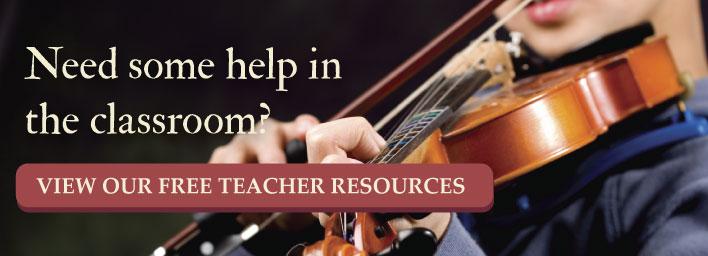Beyond Pop: The Case For Classical Music In The Classroom


Budgeting constraints often characterize school board decisions, and historically, music programs and other activities that are considered expendable are the first to feel the squeeze when changes are made. The arts suffer because of a lack of recognition to the advantages they provide students. And not just those who excel in other areas. The arts are able to reach high-risk kids through productive outlets and special needs children are able to use arts and music as a way to communicate.
Yet, recently the view concerning music training and the inclusion of the arts in mandatory school curriculum has been shifting. As more scientific studies confirm the academic, physical, and social benefits of early music education, many schools around the nation and the world are pushing to protect and expand the arts programs offered to children in both public and private settings. However, making the case for classical music is still an ongoing debate with scholars and legislators.
Controversial Issues
In the 1990’s, researchers from the University of California, Irvine, shocked the world with what came to be known as the Mozart Effect. Basically, the study showed that college students, after listening to ten minutes of Mozart, performed better in certain areas of an intelligence test. But, the findings took on a life of their own and before long the general perception that simply listening to classical music increases intelligence took hold.
Yet, many scholars were skeptical and cited instances that showed that listening to classical music did not have a significant effect on intelligence levels. Indeed, the early part of this century was characterized by this disbelief. But, others still maintained that the power of music to generate cognitive and behavioral improvements was real, and set out to examine the issue using more specific controls and the enhanced technology available. And, recent imaging techniques that are designed to measure and catalog firing synopses and brain connectivity have definitively shown that music instruction, especially when paired with learning to play an instrument, does indeed increase brain cognition and forges the connections that enhance lifelong brain activity.
Current Struggles
Although there is more information released daily concerning the benefits of classical music—and truly, the scope is extensive—schools still struggle with underfunded art programs and direct cuts. The debate is really about why classical music should be studied and included in schools. With all the emphasis placed on academic enrichment, scholars like Jessica Hoffman Davis, a cognitive development psychologist and founder of the Arts in Education Program at the Harvard Graduate School of Education and other are trying to turn the tide by stressing the intangible benefits gained through arts education.
Studying classical music and other forms of art develop so much more than just cognitive activity. The arts introduce students to life skills that offer qualitative improvements that are difficult to gauge but are no less important than academic achievements.
Realizing the Benefits
Having been shown to reduce stress and foster positive communication among special needs students, classical music instruction also teaches students valuable life skills that will promote future success. And although these benefits are hard to measure, they are very real.
The differences between popular and classical music are extensive. Unlike pop, classical compositions are often at least 20 minutes in length, and rather than focusing on vocals, presents a range of orchestral sounds that stimulate various areas of the brain. Scores run the gamut of the musical scale and present a wide array of dynamic (loud and soft) sounds. And it is these differences that create the impact.
Moreover, learning to play an instrument requires a level of determination, envisioning skills, and teamwork that other school subjects lack. And because music instruction involves developing mastery through repeated practice and being able to interpret and send non-verbal communications, it builds perseverance and interpersonal skills. Students are able to envision how a completed piece should sound, and if they are instructed in composition, they can develop the imaginative processes that characterizes problem solvers.These type of skills may not be touted during grade school, but their early development aids the transition into higher learning and eventually the workforce.
Making the case for music in the classroom really involves looking at the benefits of musical education as it is able to enhance the entire scope of student development. And when viewed in that way, including classical music in the classroom is a no-brainer.


